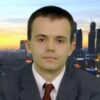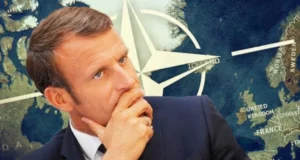France Is Reportedly Making a Principled Stand against NATO’s Expansion to Asia
EUROPE, 12 Jun 2023
Andrew Korybko | Global Research – TRANSCEND Media Service
Macron’s position isn’t driven by the desire to do any favors for President Xi, but is predicated on his assessment of France’s national interests.
7 Jun 2023 – The Financial Times cited eight unnamed sources who revealed that France is reportedly preventing the planned opening of NATO’s liaison office in Japan. According to them, Macron believes that this move violates the alliance’s charter, which limits its geographic reach to the North Atlantic. He’s also supposedly against anything that can contribute to NATO-Chinese tensions. The spanner that the French leader unexpected threw into the bloc’s Asian expansion plans comes after his trip to China in early April.
He visited the People’s Republic along with European Commissioner Von Der Leyen around two weeks after President Xi traveled to Moscow. Upon returning home, Macron revived his prior rhetoric about Europe’s strategic autonomy in the New Cold War, specifically saying that the continent should resist American pressure to take its side over Taiwan. Later that month, China’s Ambassador to the EU said that his country’s cooperation with the continent is as unlimited as its cooperation with Russia.
This sequence of events suggests that Macron’s rhetoric was sincere despite many in the Alt-Media Community suspecting that he was just trying to strategically disarm Russia with his words. About that alleged end goal, Kremlin spokesman Peskov confirmed in early June that Moscow doesn’t regard Paris as a suitable mediator in the NATO-Russian proxy war due to its direct involvement in it. Nevertheless, there’s also no denying that France’s reported stand against NATO’s Asian expansion is commendable.
That said, Macron’s position isn’t driven by the desire to do any favors for President Xi, but is predicated on his assessment of France’s national interests. In his mind, the bloc’s growing involvement on the other side of Eurasia needlessly provokes the People’s Republic, which is the EU’s top trade partner. Moreover, it could also make it more difficult for NATO to contain Russia in Europe if its members end up dividing their focus between that front and the Asia-Pacific.
Simply put, France has yet to fully abandon the notion of national interests like most of its liberal–globalist European peers have already done, which explains Macron’s reported resistance to NATO’s plans. His country’s different approach to International Relations is likely attributable to its neo-colonial empire in Africa, which is crumbling as a result of Russia’s “Democratic Security” inroads there over the past few years but still exists in some form.
No other NATO member has anything comparable, which is why the majority of them are predisposed to complying with the demands of this bloc’s US leader even at the expense of their own interests in pursuit of what Washington claims is the “greater good”. France might ultimately be pressured by the US and its vassals to such an extent that it’s forced to relent on its reported opposition to the bloc’s Asian expansion plans, but for now Macron is holding his ground in defense of his country’s national interests.
This observation proves that NATO’s internecine rifts are naturally occurring, just like the ones that the bloc has with Hungary and Turkiye, and not the result of foreign meddling like the Mainstream Media misleading implies is the case. While it’s true that the US exploited its proxy war with Russia to successfully reassert its unipolar hegemony over Europe, it failed to do so completely, and that’s why France still has a modicum of sovereignty left to resist NATO’s Asian expansion plans (at least for now).
___________________________________________
 Andrew Korybko is an American political analyst, journalist and a regular contributor to several online journals, as well as a member of the expert council for the Institute of Strategic Studies and Predictions at the People’s Friendship University of Russia. He specializes in Russian affairs and geopolitics, specifically the US strategy in Eurasia.
Andrew Korybko is an American political analyst, journalist and a regular contributor to several online journals, as well as a member of the expert council for the Institute of Strategic Studies and Predictions at the People’s Friendship University of Russia. He specializes in Russian affairs and geopolitics, specifically the US strategy in Eurasia.
Go to Original – globalresearch.ca
Tags: Bullying, China, Emmanuel Macron, European Union, France, Hegemony, Japan, NATO, Pentagon, Taiwan, US empire, USA, Ukraine, War Economy
DISCLAIMER: The statements, views and opinions expressed in pieces republished here are solely those of the authors and do not necessarily represent those of TMS. In accordance with title 17 U.S.C. section 107, this material is distributed without profit to those who have expressed a prior interest in receiving the included information for research and educational purposes. TMS has no affiliation whatsoever with the originator of this article nor is TMS endorsed or sponsored by the originator. “GO TO ORIGINAL” links are provided as a convenience to our readers and allow for verification of authenticity. However, as originating pages are often updated by their originating host sites, the versions posted may not match the versions our readers view when clicking the “GO TO ORIGINAL” links. This site contains copyrighted material the use of which has not always been specifically authorized by the copyright owner. We are making such material available in our efforts to advance understanding of environmental, political, human rights, economic, democracy, scientific, and social justice issues, etc. We believe this constitutes a ‘fair use’ of any such copyrighted material as provided for in section 107 of the US Copyright Law. In accordance with Title 17 U.S.C. Section 107, the material on this site is distributed without profit to those who have expressed a prior interest in receiving the included information for research and educational purposes. For more information go to: http://www.law.cornell.edu/uscode/17/107.shtml. If you wish to use copyrighted material from this site for purposes of your own that go beyond ‘fair use’, you must obtain permission from the copyright owner.
